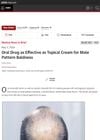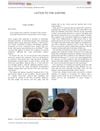Search
for
Sort by
Research
150-180 / 1000+ resultsresearch Before-After Study With 24-Hour Ambulatory Blood Pressure Monitoring After the First Dose of 5 Mg Oral Minoxidil
A 5-mg dose of oral minoxidil slightly lowers blood pressure temporarily, especially in those with higher initial blood pressure.
research Morning Periorbital Edema Due to Low-Dose Oral Minoxidil
research BH16: Trichorrhexis Nodosa Improving with Oral Minoxidil: A Case Report
research Adverse Effects of Low-Dose Oral Minoxidil for Androgenetic Alopecia in 435 Patients
research Faculty Opinions Recommendation of Safety of Low-Dose Oral Minoxidil for Hair Loss: A Multicenter Study of 1404 Patients
research Faculty Opinions Recommendation of Safety of Low-Dose Oral Minoxidil for Hair Loss: A Multicenter Study of 1404 Patients
research Indications, Efficacy, and Side Effects of Oral Minoxidil: An Integrative Review
research Faculty Opinions Recommendation of There Is a Positive Dose-Dependent Association between Low-Dose Oral Minoxidil and Its Efficacy for Androgenetic Alopecia: Findings from a Systematic Review with Meta-Regression Analyses
research Insights Into Perceptions and Gender Differences About Androgenetic Alopecia in an Observational Study of Commenters on the New York Times Oral Minoxidil Article

research Hair Are the Rankings—5-Alpha Reductase Inhibitors and Minoxidil in Male Androgenetic Alopecia
Minoxidil and finasteride are FDA-approved treatments for male hair loss, but off-label use of oral minoxidil, dutasteride, and higher doses of finasteride and minoxidil is increasing.

research Oral Drug As Effective As Topical Cream For Male Pattern Baldness
Oral minoxidil works as well as topical minoxidil for male pattern baldness.

research Minoxidil
Oral minoxidil for hair loss caused mild side effects in some men, but most continued treatment.

research Minoxidil
Oral minoxidil may slow male pattern baldness and cause body hair growth, but hair loss can happen after stopping it.
research Literature Review: Oral Minoxidil for Female Pattern Hair Loss, Topical Finasteride for Treatment of Androgenetic Alopecia, Sulfotransferase Activity Predicts Response to Minoxidil
Oral minoxidil helps female hair loss, topical finasteride treats AGA, and sulfotransferase activity predicts minoxidil effectiveness.
research Systemic Minoxidil for Hair Disorders in Pediatric Patients: A Safety and Tolerability Review
Low-dose oral and sublingual minoxidil seem safe for children with hair disorders.

research Treatment of Alopecia Areata in Pre-Adolescent Children with Oral Tofacitinib: A Retrospective Study
Oral tofacitinib may effectively treat hair loss in children with alopecia areata.

research Generalized Hypertrichosis After Treatment With Topical Minoxidil
Too much topical minoxidil can cause excessive hair growth, but stopping treatment reverses it.

research Hair Loss With Minoxidil Withdrawal
Stopping minoxidil caused significant hair loss, but regrowth occurred after resuming use.

research Low-Dose Daily Aspirin Reduces Topical Minoxidil Efficacy in Androgenetic Alopecia Patients
Daily low-dose aspirin lowers minoxidil's effectiveness for hair loss treatment.

research Loose Anagen Hair Syndrome: Treatment with Systemic Minoxidil Characterized by Marked Hair Color Change
Minoxidil treatment can reduce hair shedding, increase hair volume, and even change hair color in patients with loose anagen hair syndrome.
research Female Pattern Hair Loss
Low-dose oral minoxidil effectively reduces hair loss in women with female pattern hair loss.

research Cross-Sectional Study on Prescription Habits in Androgenetic Alopecia Among Dermatologists in Spain in 2017
In 2017, Spanish dermatologists most often prescribed minoxidil and finasteride for male hair loss, and minoxidil and oral contraceptives for premenopausal female hair loss.

research A Falling Out Following Minoxidil: Telogen Effluvium
A man lost a lot of scalp hair quickly after stopping minoxidil, but it grew back with mild male pattern baldness.

research Management of Hair Loss After Severe Acute Respiratory Syndrome Coronavirus 2 Infection: Insight Into the Pathophysiology With Implication for Better Management
Hair loss is a frequent long-term effect of COVID-19, and oral minoxidil is the most common effective treatment.

research Sublingual Minoxidil for the Treatment of Male and Female Pattern Hair Loss: A Randomized, Double-Blind, Placebo-Controlled, Phase 1B Clinical Trial
Sublingual minoxidil safely promotes hair growth.

research Prescribing Habits for Androgenic Alopecia Among Dermatologists in Spain in 2017: A Cross-Sectional Study
In 2017, Spanish dermatologists commonly prescribed topical minoxidil, oral finasteride, and nutricosmetics for hair loss, with oral contraceptives also used for premenopausal women. Less common were oral dutasteride, due to side effects, and newer, more expensive treatments like topical finasteride and Low-Level Laser Therapy. The conclusion is that there's a need for prescription guidelines due to varied treatment approaches.

research The Inflammatory Component of Androgenetic Alopecia
Androgenetic alopecia, a genetic disorder affecting up to 50% of adults, is caused by an excessive response to androgens leading to hair follicle shrinkage. Treatments include FDA-approved drugs, other therapies like low-dose oral minoxidil, and hair transplantation.

research Prescribing Habits for Androgenic Alopecia Among Dermatologists in Spain in 2019–2020: A Cross-Sectional Study
In Spain, dermatologists most commonly prescribe topical minoxidil and oral finasteride for male hair loss, and topical minoxidil and oral contraceptives for female hair loss. The use of oral dutasteride and oral minoxidil has significantly increased over the past three years.

research The Role of Minoxidil in the Treatment of Alopecia Areata: A Systematic Review and Meta-Analysis
Minoxidil shows promise for alopecia areata, but more research is needed before it can be recommended as a primary treatment.